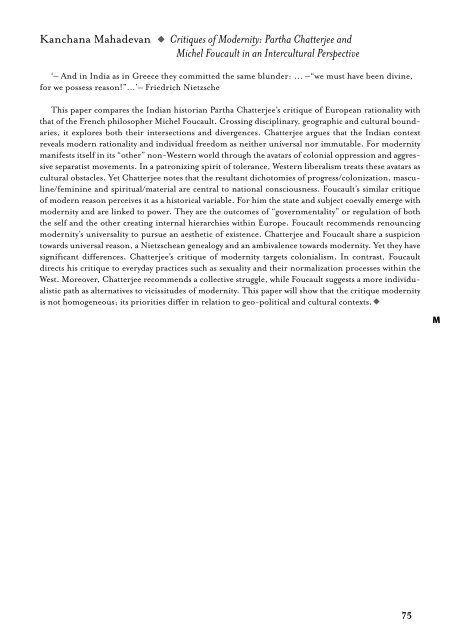Verlag.Buchhandel.Service. - Österreichische Gesellschaft für ...
Verlag.Buchhandel.Service. - Österreichische Gesellschaft für ...
Verlag.Buchhandel.Service. - Österreichische Gesellschaft für ...
Sie wollen auch ein ePaper? Erhöhen Sie die Reichweite Ihrer Titel.
YUMPU macht aus Druck-PDFs automatisch weboptimierte ePaper, die Google liebt.
Kanchana Mahadevan ◆ Critiques of Modernity: Partha Chatterjee and<br />
Michel Foucault in an Intercultural Perspective<br />
‘– And in India as in Greece they committed the same blunder: ... –“we must have been divine,<br />
for we possess reason!”…’– Friedrich Nietzsche<br />
This paper compares the Indian historian Partha Chatterjee’s critique of European rationality with<br />
that of the French philosopher Michel Foucault. Crossing disciplinary, geographic and cultural boundaries,<br />
it explores both their intersections and divergences. Chatterjee argues that the Indian context<br />
reveals modern rationality and individual freedom as neither universal nor immutable. For modernity<br />
manifests itself in its “other” non-Western world through the avatars of colonial oppression and aggressive<br />
separatist movements. In a patronizing spirit of tolerance, Western liberalism treats these avatars as<br />
cultural obstacles. Yet Chatterjee notes that the resultant dichotomies of progress/colonization, masculine/feminine<br />
and spiritual/material are central to national consciousness. Foucault’s similar critique<br />
of modern reason perceives it as a historical variable. For him the state and subject coevally emerge with<br />
modernity and are linked to power. They are the outcomes of “governmentality” or regulation of both<br />
the self and the other creating internal hierarchies within Europe. Foucault recommends renouncing<br />
modernity’s universality to pursue an aesthetic of existence. Chatterjee and Foucault share a suspicion<br />
towards universal reason, a Nietzschean genealogy and an ambivalence towards modernity. Yet they have<br />
significant differences. Chatterjee’s critique of modernity targets colonialism. In contrast, Foucault<br />
directs his critique to everyday practices such as sexuality and their normalization processes within the<br />
West. Moreover, Chatterjee recommends a collective struggle, while Foucault suggests a more individualistic<br />
path as alternatives to vicissitudes of modernity. This paper will show that the critique modernity<br />
is not homogeneous; its priorities differ in relation to geo-political and cultural contexts. ◆<br />
75<br />
M


